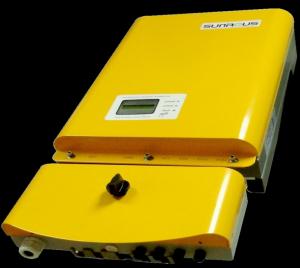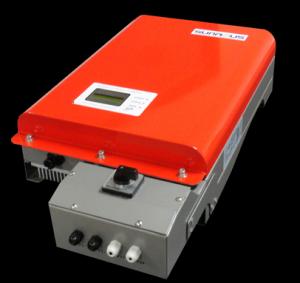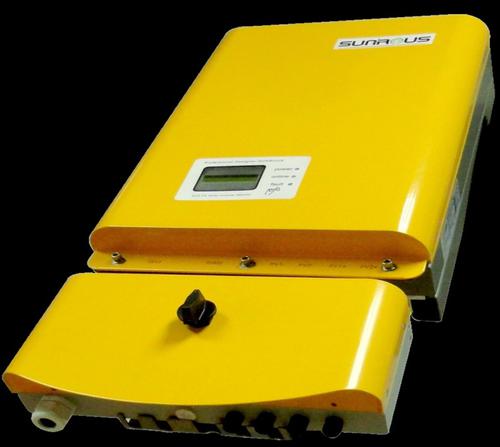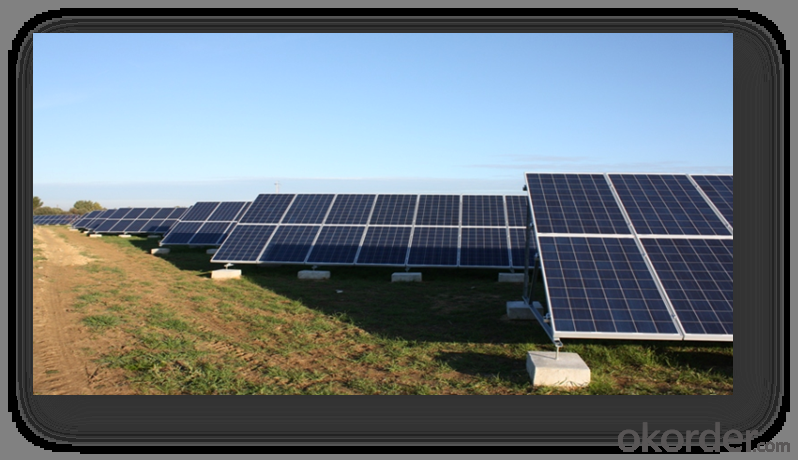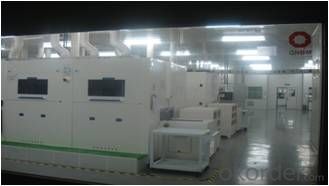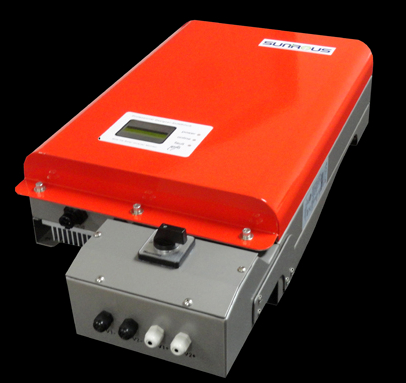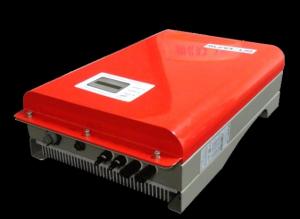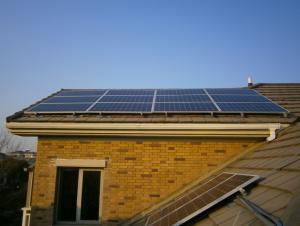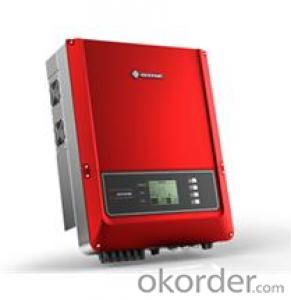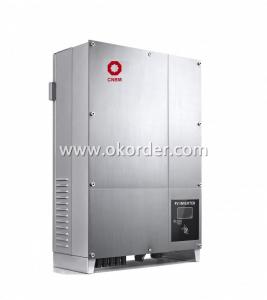1800 Watt High Frequency Transformer Isolation PV Grid-Tied Inverter
- Loading Port:
- Shanghai
- Payment Terms:
- TT or LC
- Min Order Qty:
- 100 mm
- Supply Capability:
- 1000 mm/month
OKorder Service Pledge
OKorder Financial Service
You Might Also Like
characteristics:
5 years warranty
· Sealing stainless steel shell, suitable for indoor or outdoor installation
· High frequency transformer isolation
· The highest effciency achieves 98%
· Wide input Voltage range
· Adopt connectors type cable connection, Easy operation and installation
· Best tracking effciency with OptiTrac MPP control
· operating temperature range -25 ℃ to + 55℃
· High reliability due to complete protection function
· Anti-theft protection
· Plug-in grounding
HF series 1.5kw — 5.0kw
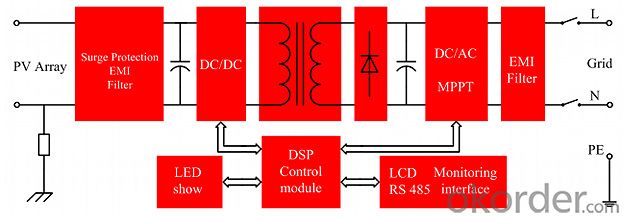
High frequency transformer isolation is the main feature of our production, which make Installation easier due to the reduced weight and higher conversion effciency because of omitting Low frequency transformer. The wide input voltage range from 180 to 600volt gives you extraordinary fexibility for you system design. Not need to set graphic display and RS485 communication system make the devices highly user-friendly.
This product can by multi-level parallel combination for 6kw to 20kw needed any power grade HF series technical parameter.
parameters:
GT1.5-ZX-01/HF | GT2.0-ZX-01/HF | GT2.5-ZX-01/HF | GT3.0-ZX-01/HF | GT4.0-ZX-01/HF | GT5.0-ZX-01/HF | |
Input(DC) | ||||||
Max.DC Power | 1600W | 2100W | 2650W | 3150W | 4200W | 5200W |
Max.DC Voltage | 600V | |||||
PV Voltage range, MPPT | 150V ~ 550V | 150V ~ 550V | ||||
Max.input current | 10.0A | 14.0A | 16.0A | 20.0A | 25.0A | 30.0A |
Number of MPP trackers | 1 | |||||
Max.number of strings (parallel) | 1 | 1 | 2 | 2 | 3 | 3 |
Output(AC) | ||||||
Nominal AC power / | 1500W | 2000W | 2500W | 3000W | 4000W | 5000W |
Max.output current | 13.0A/7.0A | 17.0A/9.0A | 21.0A/12.0A | 25.0A/14.0A | 21.0A | 30.0A |
Nominal AC Voltage / range | 102-138Vac/180-264Vac | 180-270Vac | ||||
AC grid frequency / range | 47.5-51.5Hz / 59.3-60.5Hz | |||||
Power factor at rated power | 1 | |||||
THD | < 3% | |||||
AC connection | Single-phase | |||||
Efficiency | ||||||
Max. efficiency/Californian efficiency | > 98.0% / > 97.0% | |||||
MPP adaptation efficiency | > 99.0% | |||||
Protection devices | ||||||
DC reverse polarity protection | √ | |||||
AC short-circuit protection | √ | |||||
Ground fault monitoring | √ | |||||
Grid monitoring | √ | |||||
Output Transient Voltage Suppression | √ | |||||
Over load | √ | |||||
Anti-islanding | √ | |||||
General data | ||||||
Dimensions (W/ H / D) in mm | 350 / 560 / 160 | 370 / 540 / 185 | ||||
Weight(Kg) | 16 | 19 | 23 | |||
Operating temperature range | -25 ~ +60℃ | |||||
Storage temperature range | -40 ~ +70℃ | |||||
Ambient humidity | 0 ~ 100% | |||||
Consumption (night) | < 0.5W | |||||
Topology | HF-transformer galvanic isolation | |||||
Cooling concept | Convection | |||||
Enclosure type | IP65 / NEMA 3R | |||||
Features | ||||||
DC connection: PV special connector | √ | |||||
AC connection: connector | √ | |||||
LCD display & Backlit | √ | |||||
LED display | √ | |||||
Interfaces: RS485 | √ | |||||
Warranty: 10 years | √ | |||||
Certificates & approvals | G83 / G59 / TUV / SAA / ETL / JET/ CE | |||||
certificates:
The Australian SAA certification
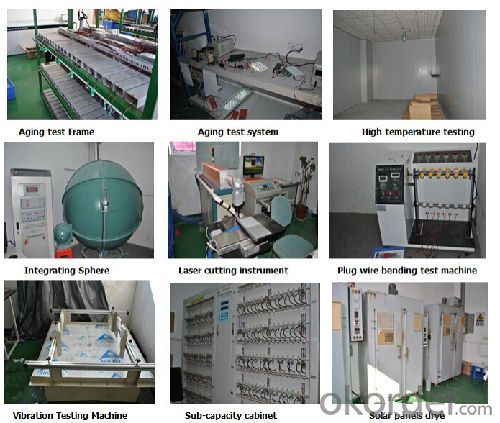
Q1 : What is you advantages
A1:
a).We are professional ups manufacturer for more than ten years and we have these staffs with rich
production and R&D
b) Excellent workers and skilled engineers
c).Our aims are to provide every customer high quality, reasonable price and excellent
service.
d)we can guarantee to send the goods on time. And also accept any transportation ways that
you require
Q2 : How do you control the production quality
A2:
a) For materials, we have IQC departments and the IQC testing follow MIL-STD-105E standard
b) in production have 4 times function testing
c) all of our products with 100% burn-in testing
d) 100% QC testing before delivery
Q3 : Do you accept OEM/ODM?
A3 : ODM&OEM are warmly welcomed !!!
- Q: Can a solar inverter be used with different types of backup power configurations?
- Yes, a solar inverter can be used with different types of backup power configurations. Solar inverters are designed to convert the DC power generated by solar panels into AC power that can be used to power electrical devices and appliances. They can be integrated with various backup power systems such as batteries, generators, or grid connections to provide uninterrupted power supply during periods of low solar generation or power outages. The versatility of solar inverters allows for flexibility in choosing and combining backup power sources based on specific needs and preferences.
- Q: Is it possible to monitor the performance of a solar inverter remotely?
- Yes, it is possible to monitor the performance of a solar inverter remotely. Many modern solar inverters come with built-in data monitoring capabilities that allow users to track and analyze the system's performance from anywhere with an internet connection. Through web-based interfaces or smartphone applications, users can view real-time data, such as energy production, power output, and system status, as well as historical data and performance trends. Remote monitoring helps identify any issues or anomalies, optimize system performance, and ensure efficient operation of the solar inverter.
- Q: How does a solar inverter handle grid synchronization during startup?
- During startup, a solar inverter handles grid synchronization by employing a process called anti-islanding. The inverter continuously monitors the grid voltage and frequency to ensure that it matches the required standards. It remains disconnected from the grid until it detects stable and synchronized grid conditions. Once the grid parameters are within the acceptable range, the inverter synchronizes its output waveform with the grid and gradually ramps up its power production. This ensures a smooth and safe integration of the solar system with the grid, preventing any potential issues like islanding or instability.
- Q: Can a solar inverter be used with different types of grounding systems?
- Yes, a solar inverter can be used with different types of grounding systems. Most solar inverters are designed to be compatible with various grounding configurations, including but not limited to grounded, ungrounded, and impedance grounded systems. However, it is important to consult the manufacturer's specifications and guidelines to ensure proper installation and compatibility with the specific grounding system in use.
- Q: Can a solar inverter be used in a solar-powered air conditioning system?
- Yes, a solar inverter can be used in a solar-powered air conditioning system. A solar inverter is responsible for converting the direct current (DC) generated by solar panels into alternating current (AC) that is compatible with the electrical requirements of air conditioning systems. By using a solar inverter, the solar energy captured by the panels can be efficiently used to power the air conditioning system, making it a sustainable and eco-friendly solution.
- Q: What are the different power output modes of a solar inverter?
- The different power output modes of a solar inverter include grid-tie mode, off-grid mode, and hybrid mode. In grid-tie mode, the inverter synchronizes with the utility grid and feeds excess solar power back to the grid. Off-grid mode allows the inverter to operate independently from the grid, providing power to a standalone system or battery storage. Hybrid mode combines both grid-tie and off-grid capabilities, enabling the inverter to utilize solar power while still being connected to the grid for backup or additional power supply.
- Q: Are there any maintenance requirements for solar inverters?
- Yes, solar inverters do require regular maintenance to ensure optimal performance and longevity. This can include cleaning or replacing air filters, inspecting and tightening electrical connections, checking for any physical damage or corrosion, and updating firmware or software as needed. Additionally, monitoring the inverter's performance and generating reports can help identify any issues or inefficiencies that may require maintenance or repairs.
- Q: How is a solar inverter connected to the solar panels?
- A solar inverter is connected to solar panels through a direct current (DC) input from the panels, which is then converted into alternating current (AC) output by the inverter.
- Q: What is the role of a solar inverter in a solar panel system?
- The role of a solar inverter in a solar panel system is to convert the direct current (DC) electricity generated by the solar panels into alternating current (AC) electricity that can be used to power household appliances and be fed back into the electrical grid. It also ensures that the electricity produced by the solar panels is of the correct voltage and frequency for safe and efficient use in homes and businesses.
- Q: Can a solar inverter be used with different types of communication protocols?
- Yes, a solar inverter can be used with different types of communication protocols. Modern solar inverters are designed to be compatible with various communication protocols such as Wi-Fi, Ethernet, Modbus, and RS485. This allows for seamless integration and monitoring of the solar inverter with different types of monitoring systems, smart home devices, or energy management systems.
Send your message to us
1800 Watt High Frequency Transformer Isolation PV Grid-Tied Inverter
- Loading Port:
- Shanghai
- Payment Terms:
- TT or LC
- Min Order Qty:
- 100 mm
- Supply Capability:
- 1000 mm/month
OKorder Service Pledge
OKorder Financial Service
Similar products
Hot products
Hot Searches
Related keywords
